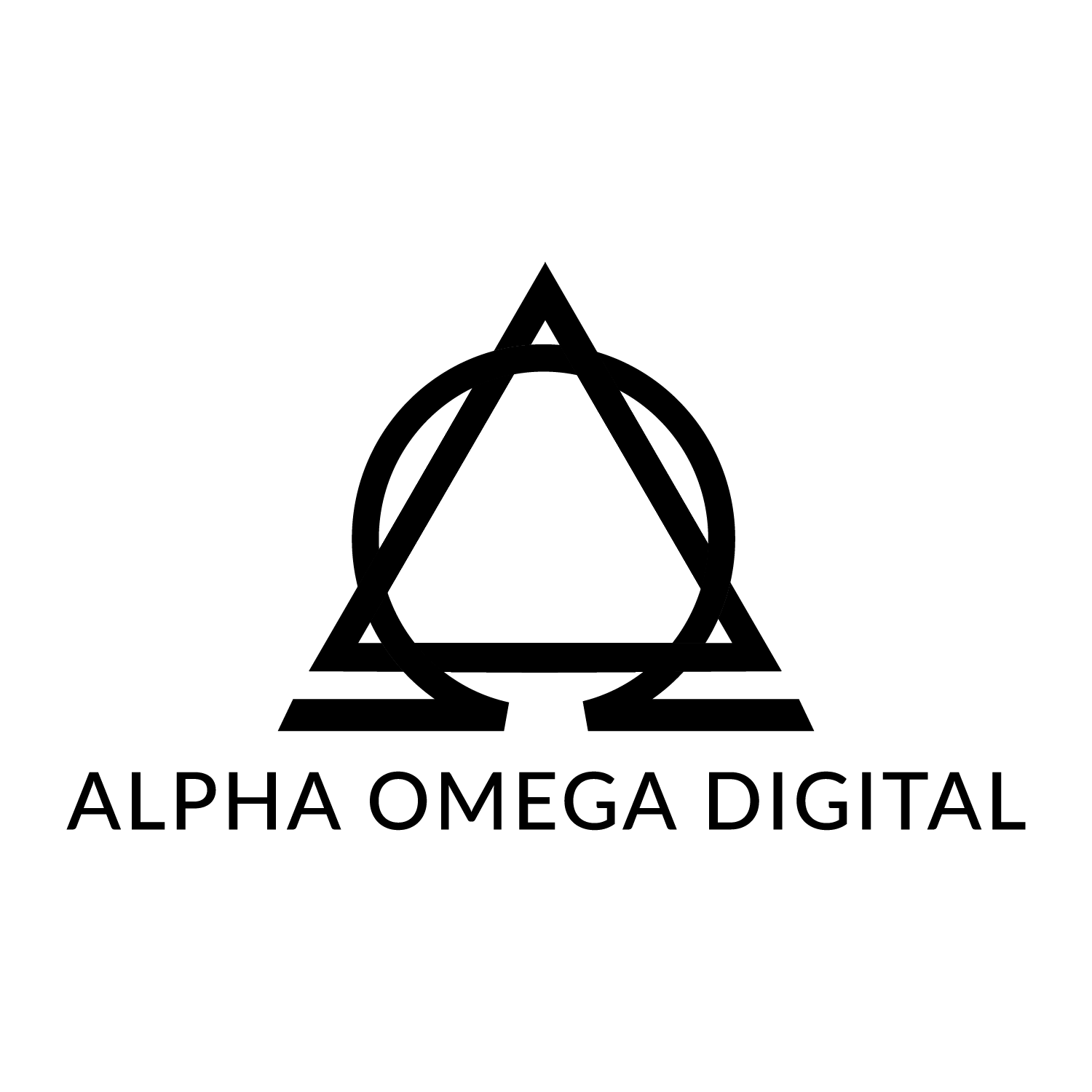As someone who lives and breathes eCommerce in Melbourne, I can tell you that local SEO isn't just another marketing task—it's your secret weapon. Getting this right is how my clients stop being just another Shopify or WordPress store and become the first choice for customers searching right here in our city. It's how we turn those "near me" searches into actual sales.
Why Local SEO is Your Melbourne eCommerce Advantage
Let's get straight to it. I’ve seen firsthand how an online store's fortunes can change when they start showing up for customers a few suburbs away. The power of local intent is massive; a search from someone in Carlton for a product you sell is way more valuable than a generic search from the other side of the country.
This isn't just a gut feeling. A huge 46% of all Google searches now have local intent. The impact of ranking well is even clearer when you see that the top local business listing grabs nearly a quarter of all clicks, at 24.4% of potential customer attention. For a Melbourne eCommerce business, that’s a direct line to more online orders and more revenue.
Your Playbook for Melbourne eCommerce Success
My goal here is to give you a practical playbook for turning local Melbourne searches into sales. Forget the complex jargon. We’re going to focus on actionable steps that I’ve used to help countless Melbourne-based eCommerce businesses, whether they're on Shopify or WordPress, connect with their local community.
We'll break down the core pillars of a strong local strategy. This isn't about theory; it's about the real-world tactics I use every day. To really get why this is so important, it's worth exploring these 9 Actionable Benefits of Local SEO and seeing how they apply to your business.
Let's start with a quick look at the key areas we’ll focus on. Think of these as the foundations for building a dominant local presence.
Key Pillars of a Winning Melbourne Local SEO Strategy
Here’s a quick overview of the essential areas we’ll focus on to build a dominant local presence for your online store.
| Pillar | Impact on Your eCommerce Business | Core Action to Take |
|---|---|---|
| Google Business Profile | Your digital storefront that builds immediate trust and visibility in local search and Maps. | Complete every single section with rich, keyword-optimised information and high-quality product photos. |
| Local Keyword Research | Uncovers the exact phrases Melbourne customers use when they're ready to buy from a local store. | Identify and target suburb-specific keywords like "click and collect Richmond" across your website. |
| On-Page SEO Signals | Tells search engines that you are a relevant, authoritative local business serving the Melbourne area. | Ensure your business name, address, and phone number (NAP) are consistent absolutely everywhere online. |
| Customer Reviews | The social proof that converts browsers into buyers and is a major local ranking factor. | Implement a simple, non-intrusive system to encourage happy customers to leave Google reviews. |
This isn't about chasing vanity metrics. It's about getting the right traffic. It’s about building a sustainable growth engine that connects your online store with your local community, one suburb at a time.
Alpha Omega Digital is a marketing agency based in Melbourne, Australia but also services clients from Sydney, Brisbane, Newcastle, Perth, Adelaide, Darwin and Hobart. Have a project in mind? Contact us.
Your Google Business Profile Is Your Digital Storefront
For a local Melbourne eCommerce business, your Google Business Profile (GBP) is easily the most valuable piece of digital real estate you own. From my experience, it's often the very first touchpoint a potential customer has with your brand.
Think of it less like a business listing and more like your primary shop window.
I see so many business owners fill out the basics—name, address, phone number—and then just forget about it. That’s a massive missed opportunity, especially in a competitive market like Melbourne. To really stand out, you need to treat your GBP with the same care you would your Shopify or WordPress homepage. From building custom blocks in Gutenberg to setting up a new Shopify API integration, the details matter.
This is your first, best chance to make a powerful impression on Google Maps and in local search results.
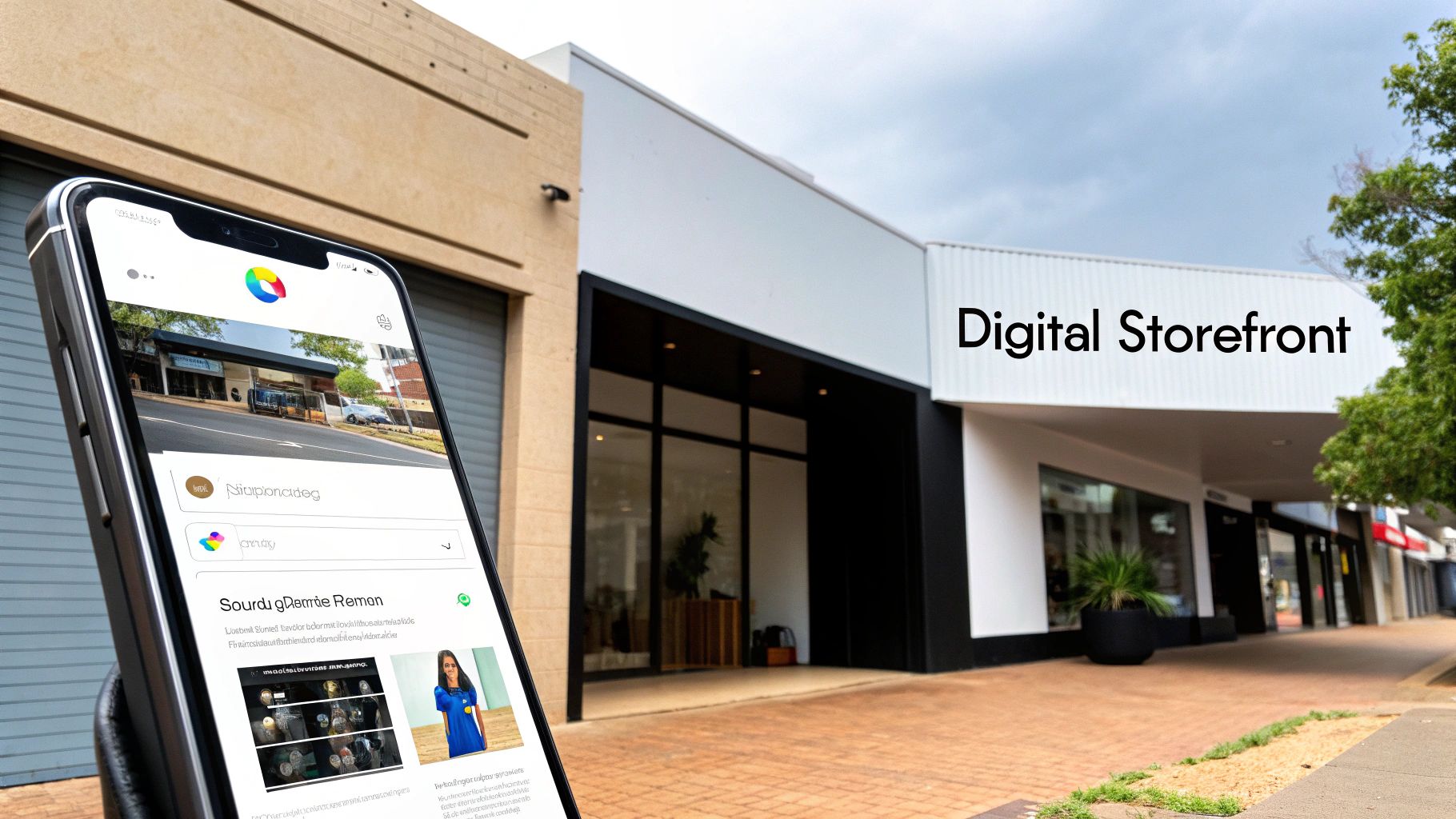
The dashboard gives you all the tools you need to go from a basic listing to a profile that genuinely pulls in customers.
Choose Categories That Actually Capture Customers
Getting your business categories right is the first, and most critical, step. Your primary category tells Google the main thing you do, but don't just stop there. Your secondary categories are where you can start snagging those more specific, long-tail searches.
This is especially crucial for an eCommerce store. Say you sell custom-printed t-shirts in Melbourne. Your primary category might be "Clothing store." But your secondary categories should drill down further:
- Custom t-shirt store: This directly targets people searching for personalised gear.
- Gift shop: This brings in shoppers looking for presents, a totally different but relevant search intent.
- Screen printing shop: This can attract B2B clients or those interested in the production side of things.
By using every relevant category, you're casting a much wider net. You’re telling Google all the different things you offer, which boosts your chances of showing up for a bunch of different local searches.
Craft a Business Description That Connects
Your business description is your elevator pitch, but it's not just for jamming in keywords; it's for people. I always tell my clients to write it with a real Melbourne customer in mind. If it makes sense, mention your connection to the city or a specific suburb.
Instead of a generic description like "We sell high-quality products," try something that tells a story:
"Discover unique, Melbourne-designed homewares from our studio in Fitzroy. We offer click-and-collect and fast local delivery across the city, making it easy to bring a piece of Melbourne's creative spirit into your home."
See the difference? It's not only rich with local keywords ("Melbourne-designed homewares," "Fitzroy") but it also speaks directly to the needs and vibe of a local shopper. For a more detailed guide on perfecting this, you can learn how to optimize your Google Business Profile effectively.
Use Google Posts for Timely Promotions
Google Posts are a seriously underused feature. I see them as free mini-ads that sit right on your GBP listing in the search results. They are perfect for announcing new product drops, weekend sales, or special offers exclusive to your Melbourne customers.
A consistent Google Posts strategy keeps your profile looking fresh and active. This signals to both Google and customers that you're an engaged, current business, which can directly influence your rankings and click-through rates.
I recommend aiming for a new post at least once a week. You can use them to:
- Showcase New Products: Upload a great photo of a new item and link straight to its product page on your website.
- Announce a Sale: Create an "Offer" post with a start and end date, and even throw in a coupon code.
- Highlight a Blog Post: Share content that solves a local problem, like a guide to "The Best Winter Jackets for a Melbourne Winter."
These posts add a dynamic layer of information that makes your profile far more compelling than a static listing. They show customers there’s always something new happening with your brand, giving them a real reason to click through to your site.
Alpha Omega Digital is a marketing agency based in Melbourne, Australia but also services clients from Sydney, Brisbane, Newcastle, Perth, Adelaide, Darwin and Hobart. Have a project in mind? Contact us.
Finding the Keywords Melbourne Customers Actually Use
Local keyword research is a totally different game to general SEO. It’s not just about what you sell, but where you sell it. After helping countless Melbourne eCommerce businesses get this right, I can tell you that nailing your keywords is what separates the local stores that struggle from the ones that become household names in their suburbs.
I'm going to walk you through my exact process for finding the phrases Melburnians are typing into Google when they're ready to buy. It’s all about moving beyond generic terms and getting granular.
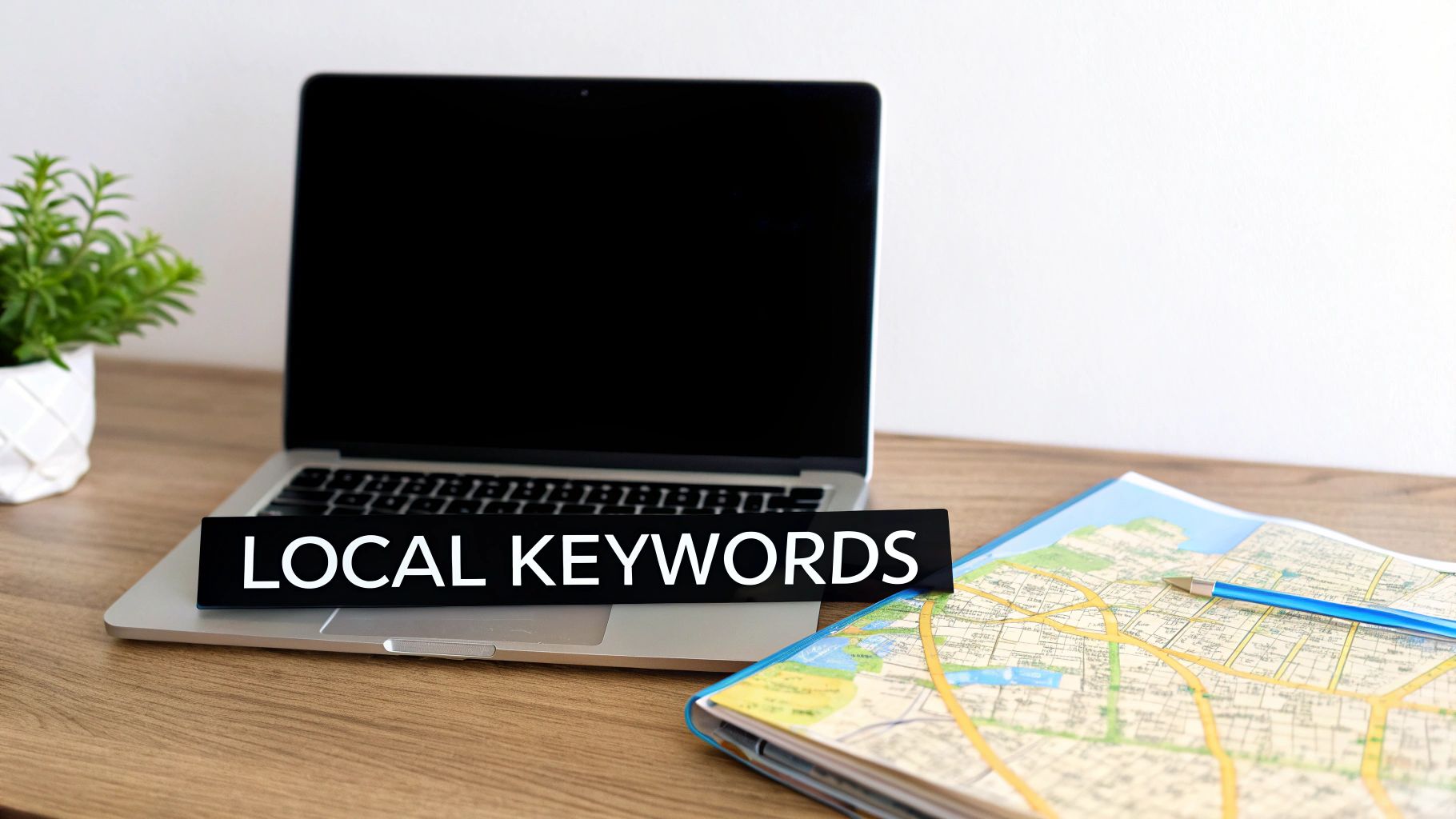
This means digging deep into specific suburbs and figuring out what customers in different pockets of the city are actually looking for.
Think Beyond Generic Product Terms
Your first instinct might be to chase keywords like "buy custom t-shirts online." While that's fine for a national campaign, it does almost nothing for your local SEO in Melbourne. We need to add that local flavour.
The goal here is to capture high-intent searches from people who are physically close and way more likely to convert. Think about how a real person searches. Someone in Richmond isn't just looking for a product; they're often looking for a local solution, fast.
Here are some of the keyword patterns I always start with for my eCommerce clients:
- [Product] + [Suburb]: "custom shopify design South Yarra"
- [Service] + [Suburb]: "shopify development Carlton"
- "Click and collect" + [Suburb]: "click and collect Richmond"
- "Same day delivery" + [Melbourne Area]: "same day delivery inner north Melbourne"
- [Product Category] + "near me": "wordpress development near me"
This simple shift in thinking moves you from competing with huge national retailers to targeting a much more qualified, local audience that's ready to buy from you.
Using Simple Tools to Find Local Gold
You don't need a bunch of expensive, complicated tools to get started. I often begin with the most powerful research tool there is: Google itself.
Start by typing your main product or service followed by "Melbourne" into the search bar. Look closely at the "People also ask" section and the "Related searches" at the bottom of the page. These are literally Google telling you what real users are looking for.
Another great little trick is to use Google Maps. Search for your product category in Maps and see what business names and descriptions pop up. You'll often find competitors are already using valuable local keywords you hadn't even thought of.
Your job is to understand the language of local search. Is a customer in Fitzroy looking for "artisan coffee beans" while someone in Frankston is searching for "bulk coffee beans"? These nuances are where you find your competitive edge.
Figuring Out Search Intent
Finding the keywords is only half the job. The next, and arguably more important, step is understanding the intent behind them. What does the searcher actually want to do?
- Informational Intent: A search like "how to set up meta conversion api" isn't a direct buying signal. The user wants a guide. This is a perfect opportunity for a blog post from your Shopify or WordPress design team.
- Commercial Intent: When someone searches for "shopify development crash course Melbourne," they're actively looking for a service. This kind of intent should be targeted with a dedicated service page on your site.
- Transactional Intent: A search like "buy handmade candles St Kilda" is from someone with their wallet out, ready to purchase. These keywords should lead them directly to a product category or a specific landing page.
Understanding this difference is critical for mapping your keywords to the right pages on your Shopify or WordPress site. You need to create content that directly answers what the user is asking for, whether they're looking to learn, compare, or buy.
Remember, Melbourne consumers have a huge preference for mobile, with nearly 60% of local searches performed on a mobile device. This, combined with a staggering 900% increase in 'near me' searches over the last couple of years, means your content has to be optimised for those on-the-go, conversational queries. You can see more insights about these local search trends over at Troov Marketing.
This deep dive into hyper-local keywords and user intent is the true foundation for building a local SEO strategy that actually connects with Melbourne shoppers.
Alright, you've got your list of hyper-local keywords. Now what? It's time to actually weave them into the fabric of your website. This is where on-page SEO comes into play, and from my experience, it's less about stuffing keywords everywhere and more about sending clear, consistent signals to Google that you’re a genuine, authoritative Melbourne business.
This is the process that turns a generic online shop into a targeted local resource that people—and Google—can trust.
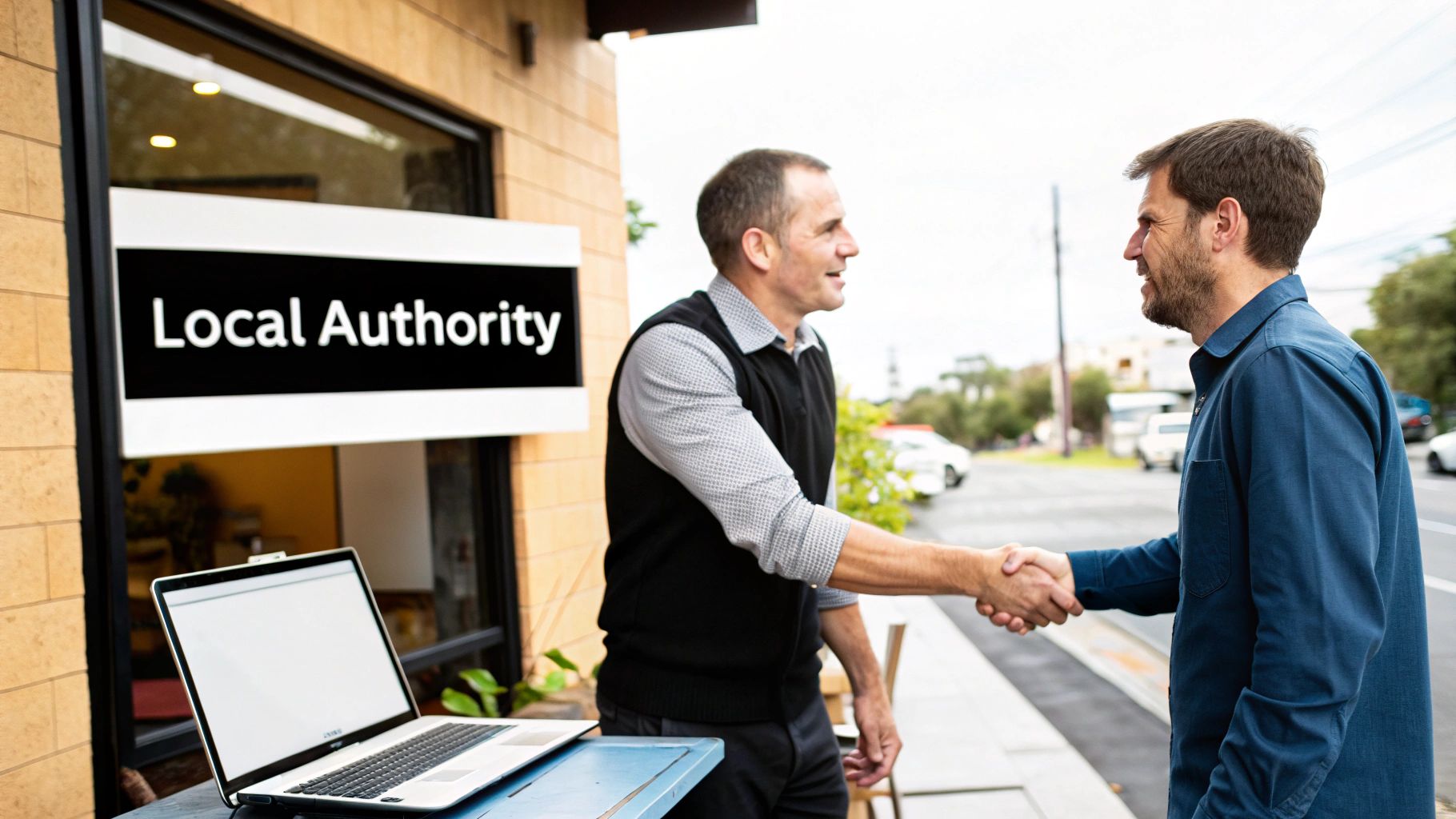
Optimising Your Core On-Page Elements
Let's start with the basics that pack the biggest punch. Your title tags, meta descriptions, and headers are prime real estate for signalling your local relevance to both search engines and potential customers.
Say you run an eCommerce store selling handmade leather goods. A generic title tag like "Handmade Leather Wallets" is a massive missed opportunity. A much stronger, locally-optimised version would be:
"Handmade Leather Wallets Melbourne | Click & Collect in Fitzroy"
This one line immediately tells Google your location and shouts about a key local service. I apply this exact same logic to meta descriptions and H1 headers, making sure the main local keyword feels natural. For instance, an H1 could be "Shop Unique Leather Goods in Melbourne". Simple, but effective.
The Critical Role of NAP Consistency
One of the most foundational—yet surprisingly often overlooked—elements of local SEO is NAP consistency. This stands for your Name, Address, and Phone number. Google absolutely needs to see the exact same information for your business everywhere it appears online.
Think of it as your digital fingerprint. If your GBP says "Street" but your website's footer says "St.", that tiny difference can create confusion and erode trust with search engines. I always tell my clients to decide on one official format and stick to it religiously.
- Website Footer: Make sure your NAP is clearly listed in the footer of every single page on your Shopify or WordPress site. Don't hide it.
- Contact Page: This page shouldn't just list your NAP. It needs to embed a Google Map showing your physical location. This is a powerful trust signal.
- Online Directories: Every single citation and business listing must match the master version on your website perfectly. No exceptions.
Consistency is non-negotiable. It’s the bedrock of local authority. Any discrepancy, no matter how minor, can dilute your local SEO signals and knock your rankings down a peg.
Building Trust with Local Citations
Speaking of directories, building local citations is a huge piece of the puzzle. A citation is simply any online mention of your business's NAP on another website. Getting listed in reputable Australian business directories sends strong signals of legitimacy and local relevance.
I always recommend starting with the big, well-known directories before moving to more niche or industry-specific ones. A few key Australian directories to get you started include:
Again, consistency here is paramount. The details in these listings must be an exact match to what's on your website and your Google Business Profile.
This methodical approach to on-page signals is exactly why Melbourne's startup scene is leaning so heavily into local SEO. The city’s unique 'shop local' vibe creates a feedback loop where businesses with genuine local authenticity and community ties get rewarded in search results. You can find more insights on how Melbourne startups are using local SEO to grow on socialspace.com.au. This isn't just a marketing tactic; it's about connecting with the local culture.
Generating and Managing Powerful Customer Reviews
Let's talk about reviews. In the world of local SEO Melbourne, reviews are your currency. They're a massive ranking signal, sure, but more importantly, they're the social proof that convinces someone in Fitzroy to choose your Shopify store over a competitor just down the street.
From my experience with countless eCommerce businesses, I've noticed most are way too passive here. They ship an order, cross their fingers, and completely miss the chance to build real trust and authority. You can't just sit back and hope reviews trickle in; you need a simple, non-aggressive system to actively encourage them.
Knowing When and How to Ask
The secret to getting great reviews is all about timing and making it ridiculously easy for the customer. If you ask at the wrong moment, it feels pushy. But if you ask at the right one, it feels like you genuinely care about their experience.
For an online store, the sweet spot is usually a few days after the product has been delivered. This gives them enough time to actually use and appreciate what they've bought. I've found that a simple, personalised follow-up email works wonders.
Here’s what that email needs:
- Keep it short and personal. Use their first name and mention the exact product they bought.
- Explain the "why." A quick line about how their feedback helps your small Melbourne business and other shoppers makes a huge difference.
- Give them a direct link. Don't just say "leave us a review on Google." Link them straight to the review submission box on your Google Business Profile. Every single click you remove from the process will dramatically boost your success rate.
Responding to Every Single Review
Getting reviews is only half the job. Managing them is where you can really set your brand apart. I make it a non-negotiable rule for my clients: respond to every single review you get—good, bad, or just okay.
Responding to a positive review is the easy part. A quick "Thanks so much, [Customer Name]! We're thrilled you love the [Product]" shows you're paying attention and you appreciate their business. It reinforces their good decision and makes them feel seen.
A thoughtful, professional response to a negative review can often win you more long-term customers than a dozen five-star ratings. It shows everyone watching—including future customers—that you are accountable, you care, and you're committed to getting things right.
When a negative review inevitably comes in, don't panic or get defensive. Just take a breath and follow this simple framework:
- Acknowledge and thank them. Start by thanking them for taking the time to give feedback, even if it stings.
- Apologise sincerely. A genuine "We're so sorry to hear you had that experience…" goes a long, long way.
- Take it offline. Never get into a public back-and-forth. Provide a direct email or phone number and ask them to reach out so you can resolve the issue privately.
- Keep it professional. Remember, your response isn't just for that one person; it's for every potential customer who will read it from now on.
This approach shows total transparency and a real commitment to customer satisfaction, which builds immense trust. It turns a potential disaster into a public display of excellent customer service—an invaluable asset for any Melbourne business trying to thrive locally.
Your Action Plan for Dominating Local Search
We’ve walked through the entire playbook for local SEO here in Melbourne. From getting your Google Business Profile just right to building a steady stream of authentic customer reviews, you now have the blueprint.
But your organic strategy doesn't have to work in isolation. In fact, it shouldn't.
Amplify Your Wins with Paid Strategies
I've found time and again that the real magic happens when you pair a strong local SEO foundation with targeted paid ads. SEO is your long game—it builds trust and authority over time. Paid ads, on the other hand, deliver immediate, hyper-targeted traffic from people who are ready to buy right now.
Think of it this way:
- Google Ads for service-based businesses: If you offer Shopify or WordPress development, you can target specific Melbourne postcodes. It's the fastest way I know to drive calls and contact form submissions. Proper setup with GTM and Google Analytics is key.
- Meta Ads: Perfect for building local brand awareness. As a Facebook ads agency, we run campaigns targeting users in specific suburbs with creative that resonates. Mastering Facebook Ads involves a solid creative testing process and knowing how to measure success so you don't quit too early. Setting up the Conversions API for Meta is non-negotiable.
- Google Shopping Ads: An absolute must for e-commerce, especially for dropshipping. Knowing the difference between PMAX vs Google Shopping Ads and using campaign priority correctly can prevent issues like your Google Shopping ads not spending budget.
This simple visual breaks down the two-part process for customer reviews—a cornerstone of building trust for both your organic and paid efforts.
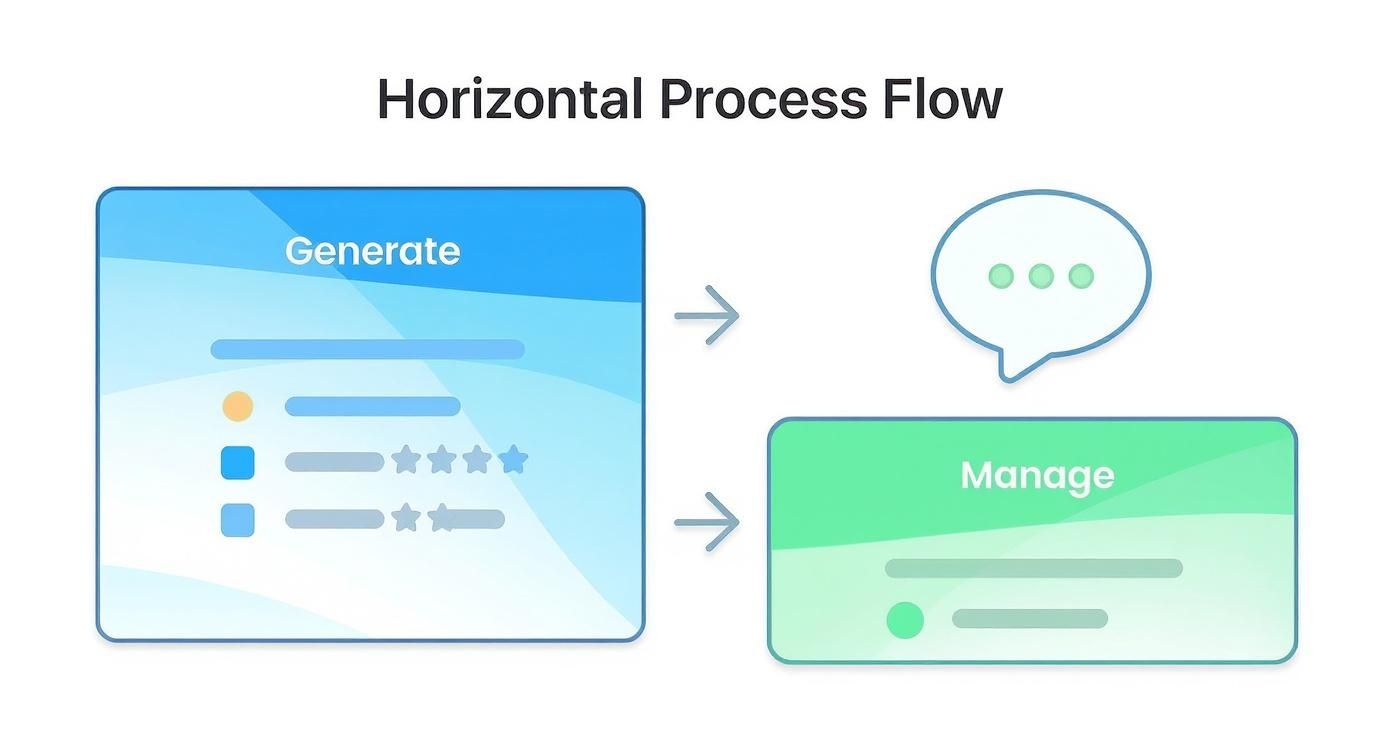
It’s a great reminder that success isn't just about getting reviews; it’s about actively managing the conversation and proving you’re a business that listens.
Alpha Omega Digital is a marketing agency based in Melbourne, Australia but also services clients from Sydney, Brisbane, Newcastle, Perth, Adelaide, Darwin and Hobart. Have a project in mind? Contact us.
Common Questions About Local SEO in Melbourne
After working with so many Melbourne eCommerce owners, I've noticed the same handful of questions pop up again and again. It's totally understandable—local SEO can feel like a different beast, especially if you're used to thinking about broader digital marketing.
Let's clear up some of the most common queries I get.
How Long Until I See Results?
This is the big one, and the honest answer is: it depends, but you'll typically see positive movement in local rankings and traffic within 3 to 6 months.
But it's not a switch you just flip on.
Foundational work, like fully optimising your Google Business Profile, can produce tangible results much faster. I've seen clients get more calls or direction requests in just a few weeks from that alone. But the real, lasting impact comes from consistency. Marketing your business = consistency. It's a long-term strategy, not a quick fix.
Can My Online Store Rank Locally Without a Physical Shop?
Yes, absolutely. But you do need a legitimate Melbourne address for verification. This is a common hurdle for many e-commerce and service-area businesses I work with.
For the Google Map Pack, a verified address is non-negotiable.
The solution is to set a service area in your Google Business Profile and then hide the physical address from the public. You'll still need to receive a postcard at that address initially to verify your business with Google, which proves you're a genuine local entity, not just a random online store.
Where Should I Start: Local or General SEO?
For any eCommerce business serving a specific geographic area like Melbourne, I always recommend starting with local SEO. Always.
It targets customers right in your backyard who have a high intent to buy, whether that's for local delivery, a service call-out, or click-and-collect. It’s about capturing the most valuable, immediate demand first. For tradies, combining this with PPC and call tracking software like CallRail or Go High Level can be incredibly powerful.
Think of it as your foundation. Once you're dominating your local area and have a steady stream of local customers, you can broaden your strategy to chase more general, national search terms. The two strategies work together beautifully, but for the best immediate return, local always comes first.
Alpha Omega Digital is a marketing agency based in Melbourne, Australia but also services clients from Sydney, Brisbane, Newcastle, Perth, Adelaide, Darwin and Hobart. Have a project in mind? Contact us.
